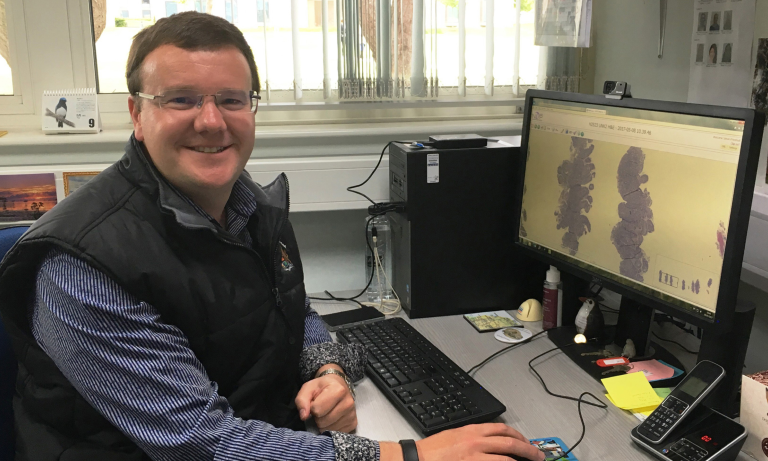The veterinary voice for animal welfare: reflecting on BVA’s updated Animal Welfare Strategy
11 Jul 2025
12 Feb 2025 | Simon Priestnall
Our next LGBT+ History Month role model, Professor of Veterinary Anatomic Pathology Simon Priestnall, offers advice for those experiencing difficulty with their sexuality or gender identity.

What inspired your path into the veterinary profession?
I’ve wanted to study science for as long as I can remember. When at school, I enjoyed and was good at biology, less good at chemistry and physics, and the less said about maths, the better! I have always been fascinated and inspired by the natural world, particularly birds, and have been an avid/obsessive ‘birder’ since about age 13. Unfortunately, I couldn’t easily think of a way to earn a living from watching birds, so veterinary medicine seemed like the best way to combine my love of animals with science and the ability to earn a salary. My parents and grandparents have always inspired me to aim high and to do what I enjoy, so off to Bristol Vet School I went in the late 1990s!
What has been the most challenging part of your career?
Leadership. My leadership style is one of listening, inclusivity and empowerment, but one can only lead if others follow. Navigating differing personality types (especially within the academic environment), discovering what drives colleagues, and learning to negotiate and compromise are all key skills I have developed and am still honing! There is a saying that it can be lonely at the top, and indeed it can, but it does not have to be. I have two excellent deputy heads of department and a really positive and enthusiastic departmental management team that provides support and sound advice.
What has been the best part of your career so far?
Passing the American board exams in veterinary pathology. This involved two trips to Ames, Iowa where the American College of Veterinary Pathologists exam used to be held each September. Having studied key diseases and pathological principles twice now, I feel I am a better pathologist for it! I vividly remember sitting alone in an airport hotel room near New York JFK airport on the return journey to London and receiving the results email. On opening it, I was in floods of tears (of joy!) as many years of study and personal sacrifice finally paid off.
What advice would you offer to someone experiencing difficulty with their sexuality or gender identity?
Life at vet school has changed over the 27 years I’ve been part of it. As a vet student in the 1990s, even in a hugely diverse and open city like Bristol, it was not easy being honest about your feelings, even to your closest friends. For me, this led to a lot of mental turmoil, and I used studying as a way of blocking out those thoughts. The biggest relief came when I told my best friend at university I was gay. He was so understanding, and the relief was immense. It was like a huge weight had been lifted from my shoulders in an instant. Now, many years later, I am hugely privileged to lead an academic department at the Royal Veterinary College where Equality, Diversity and Inclusion is a core mission and the environment is open, inclusive and really quite liberating. I spent a lot of time as a student thinking about how others would react, imagining they would no longer be my friends if I came out. In reality, none of that was true. Therefore, the best advice I can give is to be honest with yourself, your friends, and your family, and the experience will likely to be a lot more positive than you imagine.
Get tailored news in your inbox and online, plus access to our journals, resources and support services, join the BVA.
Join Us Today